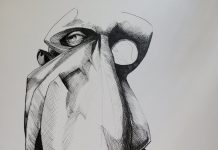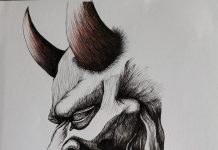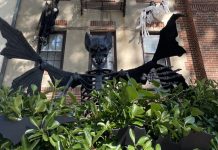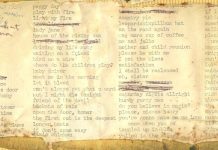We godless devils want the treasure map;
you good and godly fellows want to live.
It’s fair straightforward bart’ring, Cap’n Smollett,
with not much elbow room for give nor take.
We’ll crush this stockade underfoot like a snail.
Give o’er the map, and we’ll give o’er your lives—
a bargain all around, no need for losers.
But this here handkerchief’s my flag of truce.
May I set myself down on your tree stump?
My crutch gets tired from holding up my carcass.
Now pay good heed to this bird on my shoulder.
“Pieces of eight! Pieces of eight!” he caws.
Old Cap’n Flint here wants to mediate,
and we could do worse for a diplomat;
his squawking’s scarce the nonsense you may think.
He’s old—no, older—than the briny sea.
He perched on the gloved hand of Francis Drake,
the greatest buccaneer that e’er there was,
knighted by the Virgin Pirate Queen
Elizabeth herself, who might as well’ve
unfurled the Jolly Roger to wave above
the decks and timbers of her Sceptered Isle—
for what was England in those golden days
but the yarest pirate ship ever sailed?
“Pieces of eight” he croaks, again, again,
till one gets sick at heart of hearing it.
But what else ’tis for anyone to say?
The tallied sum of all accounts is stowed
in that taut turn of words—“Pieces of eight.”
Cap’n Flint remembers when ’twas first spoke,
“Pieces of eight,” after the Fall from Eden,
when sons of men burrowed to fall still farther.
His lum’nous plumage cast its precious light
in the bowels of the first mines ever dug
at the orders of the hunched angel Mammon,
cast out with Satan and his warrior hordes—
Mammon, whose rum-drunk eyes gaze ever downward.
That was the first piracy, I’d maintain,
despoiling Mother Earth of what was hers
and hers alone—pound by pound, ton by ton,
nuggets and ingots and wagons and shiploads
of her tender flesh, while Mammon conducted
the hellish miners’ chorus: “Pieces of eight.”
’Twas then this parrot learned his wretched song.
But let’s scan your thinking, as best I take it.
You’ll do honest with our stolen treasure
if you can dig it up before we do.
Perhaps you’d give it back to them whose throats
we cut for it—but were it wise to go
hunt them out in their current whereabouts?
I hear it’s fiendish hot down in their tropics,
for those blighters were no angels themselves;
such sinless men as you are a rare breed.
No, you’d rather keep it, and I can’t blame you.
You’re not like us, I’ll be the first to warrant;
you’re decent, well-spoke, clean, and civilized—
and sober, which my men are surely not;
you worship a God way up yonder skyward,
a God my poor brain’s too stunted to reach.
It’s only square for you good honest men
to snatch our stealings into your good care.
But tell me—do two thefts make a right sale,
first by pirates, again by honest men?
Can theft cancel theft, crime unravel crime?
Because what’s plundered has been stolen double
is it legit’mized as a lawful haul?
In short, is it more rightly yours than ours?
Answer this riddle for me if you can:
What gives preciousness to gold and silver
so sons of men covet such things as glister?
Look, in my palm, a doubloon and a Spanish
dollar, minted from gold and silver each.
They don’t so much as twinkle as we spy ’em;
they’ll look dullish till I wipe ’em with spit.
Devious solid to the touch they feel,
and yet so soft and yielding, they would melt
and go to oozing ’tween my greedy fingers
if I so much as puffed my hot breath on ’em.
Such variable metals, gold and silver;
not pract’cal for the skillets, pans, and kettles
employed by sea cooks such as my good self;
too ready blunted to make knives and axes;
prone to bursting when hollowed out and charged
with powder, too heavy for balls of shot;
too scarce to forge into gallows enough
to hang all them that ought rightly to hang,
for who’re the souls that don’t deserve that fate?
But there’s tricks in the alchemy of theft
that makes of sparkling things more than they are.
A coin’s value to a man is in proportion
to what gets wrung out from another’s hands;
its price is weighed by how some poor soul lacks it;
it measures out the emptiness of bellies;
it’s stamped with gaping faces dispossessed—
the sick, the starving, destitute, and slain.
Aye, Cap’n—aught that gets owned is blood and terror,
and we pirates do due diligence by both,
shirking not lives of man, woman, nor child,
but toiling always to earn our proper swag.
Can you kind gentlemen say nigh the same?
It’s time to play my winning hand, good Cap’n.
I’ve not come here for any earnest dealing;
my showing here’s a sham; we two shan’t haggle;
the only settling left to do is slaughter.
I’ve made a fine treaty with Mother Earth
already, for we parleyed in a dream.
I found her the vestige of a grand lady—
Daughter of Paradise, Refuge of Sinners,
Isis Unveiled, Wise Muse of Solomon,
the Lavish Madonna of all Abundance,
enthroned in luxury botanical,
her cornucopia bountiful and brimming,
a twelve-star constellation in her crown,
our round world raised upon her royal scepter.
But she was weary when we met last night,
her diadem drooping, her bright vestments faded,
with tear-shaped pearls upon her pallid cheek
and black-winged sighs heaving out of her breast—
all, all, she says, because of honest men
and the wrongs they wreak upon her creation.
“’Tis honest men, not thieves,” she said, “who bolt
their lowly brothers in shackles, consigning
them to swallow pitch black soot by the lungfuls
in caves that harvest coal. ’Tis honest men,
not thieves, who choke and suffocate the sky
with smoke from heaps of flaming anthracite.
’Tis honest men, not thieves, who put the fingers
of mothers and their babes to bleeding in
mills fueled by sulf’rous, profitable fires,
mills where raiments of the rich are made,
mills where wealth is manufactured from despair,
mills that weave out of tears and hunger
and disease all merchandises fine and dear,
mills where godliness incubates and hatches,
taking wing in this vale of decency,
of gluttonous virtue and righteous greed.
“Take it all,” she told me. “Reclaim the treasure
from my bosom, and give me nothing in
return but bloody lives of honest men—
more than their lives, give me their shrieking pain,
that they may feel the agony of earth,
the rape of all my innocence and bounty.
Don’t let your cutlasses and daggers rest
until they’re slain, the cursed multitude
of all the virtuous and honorable
throughout this doomed and damned bedeviled world,
and thieves receive their just inheritance,
for the earth shall be theirs when time gets full.
Then shall my poor heart leap with exultation
and my visage blush sanguine once again.”































